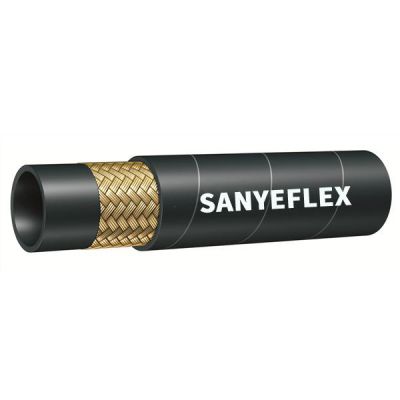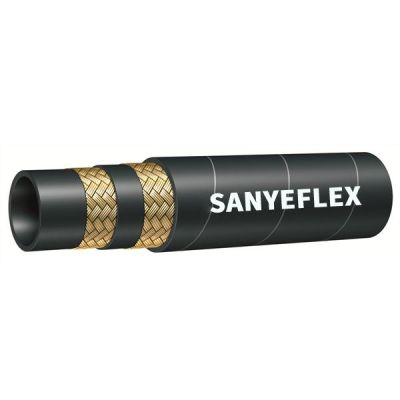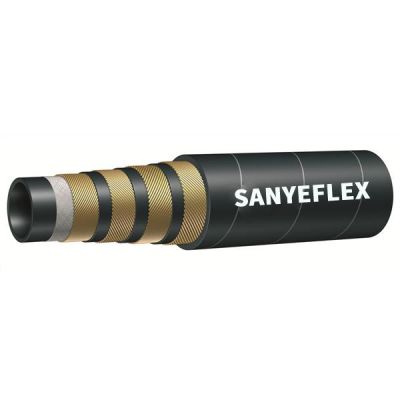Oct. 23, 2024
Hydraulic hoses play a crucial role in various industrial applications, transmitting hydraulic fluid to power machinery and equipment. Over time, hydraulic hoses can degrade due to factors such as wear, pressure, temperature, and exposure to chemicals or environmental elements. Understanding the lifespan of hydraulic hoses is essential for ensuring safe and reliable operation in hydraulic systems. Let's explore the factors that influence the longevity of hydraulic hoses and how to maximize their lifespan.
Several factors contribute to the deterioration of hydraulic hoses over time, including:
Material Degradation
Hydraulic hoses are typically made from synthetic rubber or thermoplastic materials that can degrade over time due to exposure to heat, ozone, UV radiation, and chemical substances. As the material deteriorates, it may become brittle, cracked, or swollen, compromising the integrity of the hose and increasing the risk of leakage or failure.
Pressure and Flexing
Hydraulic hoses are subjected to high-pressure conditions and repetitive flexing during operation, which can cause fatigue and wear on the hose material. Over time, this cyclic loading can lead to the development of cracks, abrasions, or bulges in the hose walls, reducing its strength and flexibility.
Temperature Extremes
Extreme temperatures, both hot and cold, can affect the performance and lifespan of hydraulic hoses. High temperatures can accelerate material degradation and cause softening or melting of the hose material, while low temperatures can make the hose material brittle and prone to cracking or failure.
Fluid Compatibility
The type of hydraulic fluid used in the system can also impact the lifespan of hydraulic hoses. Certain fluids, such as synthetic oils or hydraulic fluids with additives, may be more corrosive or abrasive to hose materials, leading to accelerated degradation and reduced lifespan.
While the lifespan of hydraulic hoses can vary depending on various factors, several measures can be taken to maximize their longevity:
Correct installation and routing of hydraulic hoses are essential for minimizing stress, abrasion, and bending that can lead to premature wear or failure. Ensure that hoses are installed with the correct bend radius, properly supported, and secured to prevent kinking, twisting, or rubbing against other surfaces.
Routine inspection and maintenance of hydraulic hoses are critical for detecting signs of wear, damage, or deterioration early on. Inspect hoses regularly for leaks, cracks, abrasions, or bulges, paying close attention to areas near fittings, bends, or connectors where stress concentrations are more likely to occur. Replace any damaged or worn hoses promptly to prevent system failure or leakage.
Monitor and control temperature and pressure levels within the hydraulic system to minimize the risk of hose degradation and failure. Ensure that operating temperatures and pressures remain within the recommended limits specified by the hose manufacturer to avoid overheating, overloading, or overpressurization of the hoses.
Select hydraulic fluids that are compatible with the hose materials and operating conditions to minimize the risk of chemical degradation or corrosion. Consult with the hose manufacturer or fluid supplier to ensure that the selected fluid is suitable for use with the hose material and application.
In conclusion, the lifespan of hydraulic hoses depends on various factors such as material degradation, pressure, temperature, and fluid compatibility. By understanding these factors and implementing proper installation, inspection, maintenance, temperature and pressure control, and fluid compatibility measures, operators can maximize the longevity of hydraulic hoses and ensure safe and reliable operation in hydraulic systems.
For further information on hydraulic hoses or to explore available options, feel free to contact us. We are dedicated to providing assistance and connecting you with reliable suppliers in the hose industry.
Our Customer
Tel.: +86 400 0318 111
Email: admin@sanyeflex.com
Add.: #218 Zhongke Street, High-tech Zone, Hengshui City, Hebei Province, China


